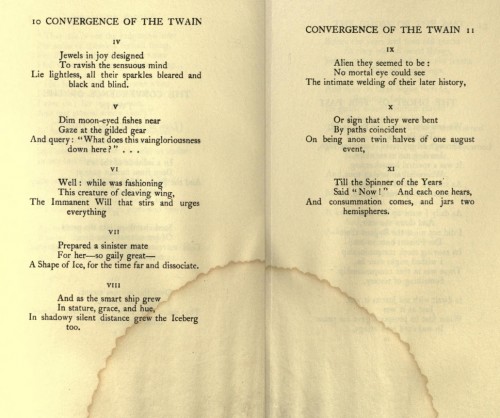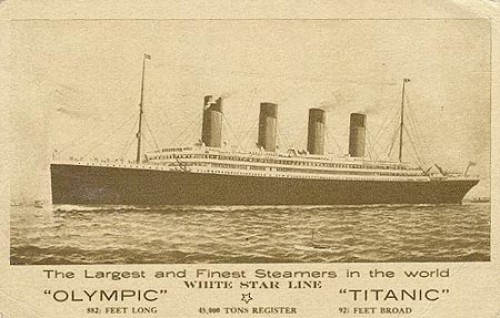In this centenary month of the sinking of the Titanic we welcome Mark Richardson, literary professor and blogger, on a poem that dips into deep and strange waters to quite astonishing effect.
Thomas Hardy first published The Convergence of the Twain in the program printed for a “Dramatic and Operatic Matineé in Aid of the ‘Titanic’ Disaster Fund,” held at the Royal Opera House on May 14, 1912 (at two o’clock, to be precise). In fact, he served as a member of the committee that organized the event. The Titanic had, of course, sunk one month earlier on April 15. Hardy later collected the poem in his 1914 volume Satires of Circumstance, Lyrics and Reveries. Ever since, it has found safe harbor in all the usual anthologies, though what the poem itself harbors remains stranger, I suspect, than many of us are willing to concede—stranger both in its phrasings and in its thought. We should find this poem astonishing.
I
In a solitude of the sea
Deep from human vanity,
And the Pride of Life that planned her, stilly couches she.II
Steel chambers, late the pyres
Of her salamandrine fires,
Cold currents thrid, and turn to rhythmic tidal lyres.III
Over the mirrors meant
To glass the opulent
The sea-worm crawls — grotesque, slimed, dumb, indifferent.IV
Jewels in joy designed
To ravish the sensuous mind
Lie lightless, all their sparkles bleared and black and blind.V
Dim moon-eyed fishes near
Gaze at the gilded gear
And query: “What does this vaingloriousness down here?” . . .VI
Well: while was fashioning
This creature of cleaving wing,
The Immanent Will that stirs and urges everythingVII
Prepared a sinister mate
For her—so gaily great—
A Shape of Ice, for the time far and dissociate.VIII
And as the smart ship grew
In stature, grace, and hue,
In shadowy silent distance grew the Iceberg too.IX
Alien they seemed to be;
No mortal eye could see
The intimate welding of their later history,X
Or sign that they were bent
By paths coincident
On being anon twin halves of one august event,XI
Till the Spinner of the Years
Said “Now!” And each one hears,
And consummation comes, and jars two hemispheres.
I suspect that few people, in 1912, spoke of the Titanic and the iceberg as having “converged” (as who should say, “You see, well, this big steamship and this giant iceberg just sort of converged“). Hardy starts with a title that re-describes the wreck in such a way as to nudge us toward the supposition underlying the poem: this was something other than a mere accident. He sees in the meeting of ship and iceberg an appalling fitness. And not simply a “convergence,” but, as Hardy later says, a “mating” (as if by things espoused)—indeed, a “consummation.” Set aside, for the moment, the sexual connotations awakened, in that word, by the metaphor of “mating.” “Consummation” denotes (as the OED tells us) the perfection or completion of an act; a fitting or inevitable outcome. I take Hardy seriously, here.
An “accident” the wreck of the Titanic may have been, but Hardy chooses to see it, as the first stanzas of the poem suggest, as a representative accident (to borrow a useful phrase from Kenneth Burke). That is to say, the accident was not really “accidental.” Human vanity and pride brought it on; this is precisely the sort of trouble men are always getting themselves into (such is the implication); it is characteristic of us. Or else the “Immanent Will” that stirs and urges everything brought it on (more about that Schopenhaurian word shortly). Or maybe the Spinner of the Years—say, Clotho, one of the Fates —brought it on. God forbid we should regard the affair as nothing but a sorry, senseless botch. Hardy declines to adhere to any single context for “interpreting” the event (Christian, philosophical, or pagan-fatalistic). But he just as surely declines to avoid “interpreting” it—framing it up, as he does, in his three differing vocabularies. The wreck simply must have been a thing somehow ordained, by whatever agency. So intelligible an event was it that Hardy had already composed his poem some two or three weeks after the ship went down. He was as “ready” for the R.M.S. Titanic as the iceberg itself.
Of course, the inclination to find “meaning” in the casualties of our lives is as eminently human as vanity and pride. This poem is an instance of that inclination. Insofar as this is the case, it’s appropriate to the occasion (i.e., to the “Dramatic and Operatic Matineé in Aid of the ‘Titanic’ Disaster Fund”). But given that the poem chastens us, humbles us (if for nothing else than for our pride and vanity), it must have struck some, in May 1912, as very cold comfort. Norman Page, in his Oxford Reader’s Companion to Thomas Hardy, makes a similar point: “The human loss and suffering involved [in the wreck] earn scarcely a mention, and here Hardy’s treatment of the theme must have been curiously out of line with the response of the majority. For him the sinking becomes a grim and ironic lesson in the vanity of human wishes.” Page goes so far as to suggest that Hardy “appropriates” the event, thereby making it “his own”: “the specificity and topicality [shrink] in relation to the poem’s philosophical framework. One can only wonder,” Page drily observes, “what the audience at Covent Garden made of it.” Cold comfort, as I say.
Anyhow, as things go in proper tragedies, so go they in The Convergence of the Twain: the all-too-human protagonists get what they deserve. And the poem affords the right kind of reader a weird catharsis—an uncanny sort of satisfaction that I shall try to account for later. Few survivors of the wreck would have reckoned it an “august event” (where “august” means “inspiring mingled reverence and admiration,” as the OED has it; or “impressing the emotions or imagination as magnificent; majestic, stately, sublime, solemnly grand; venerable, revered”). But Hardy does so reckon it, and he expects the right kind of reader to do the same. The general scheme of things is self-correcting: vanity begets humility; vanity humbles itself. All is bleakly right with the world. I don’t consider any of this a failure of taste on Hardy’s part. One is impressed, instead, with the insignificance of human affairs; we are buffeted about by forces unthinkably immense.
The third line of the poem echoes 1 John 2: 16: “For all that is in the world, the lust of the flesh, and the lust of the eyes, and the pride of life, is not of the Father, but is of the world.” Here opens a Christian frame of reference that, some might say, sorts uncomfortably with the other ones Hardy will employ (whether by referring to the “Immanent Will” or to “The Spinner of the Years”). I wouldn’t have thought “solitude” a countable noun, but Hardy makes it one here. The Titanic resides now in “a solitude of the sea,” not “the solitude”—quite as if some peculiar place had been held for her, as in fact the poem will suggest it has been.
Whatever the case, this “solitude” has been held for her to “couch” in, and “stilly” couch in at that. I want to fetch in an archaic sense for the verb “couch” here. I want the word to bear some such sense as operates in the following citation from the OED, illustrating the verb in its transitive mood: “That your vanity may be hereafter coutched” (the citation is from 17th century work by Robert Macward). To “couch” a thing (here) is to put it down, to quell it, to suppress it, to lower it in dignity (OED senses 10-11). Of course, in the poem the verb is intransitive, and “to couch” (intransitively) means to lie at rest, as the Titanic does. But “to couch” (intransitive) is also to bow down, to submit, to succumb (OED senses 16-17). The themes Hardy sounds in the poem bring all these senses out (or anyway, the themes allow for them).
Hardy speaks of the “Pride of Life” that “planned” the Titanic, not the “Pride of Life” that “built” her. To speak of “planning” (as against “building”) takes in, and impugns, a great many more folk, I should think, than the builders: the very conception of such a vessel is damned. It takes the whole of a nation, of a culture, to “conceive” such a thing—to summon it up as a desideratum, as a possibility. Hardy generalizes the Pride of Life (on good scriptural authority, after all). He implicates all of us in it.
And later:
Over the mirrors meant
To glass the opulent
The sea-worm crawls—grotesque, slimed, dumb, indifferent.
“Glass” takes its place as a verb (a role seldom assigned it after the 19th century). Hardy so constructs the sentence laid into this stanza as to place its subject at the head of the long third line. This structure “glasses” or mirrors the structure of stanza two: the “cold currents thrid,” “the sea-worm crawls.” In terrestrial graveyards we inevitably find what William Empson once called the “miraculous corpse worm” (that familiar engine of decay and emblem of death). Well, just so in the depths of the ocean—in the tomb the Titanic has become—we have the sea-worm. That creature may be “dumb,” but it speaks with eerie eloquence. Look into the glass now, you opulent, vain, proud men and women, and tell us what you see: the much-fabled worm of mortality (and the vanity of human wishes). Our sea-worm is as “indifferent” to social degree (let’s say) as the worm Hamlet famously speaks of (in 4.iii):
Hamlet. A man may fish with the worm that hath eat of a king, and eat of the fish that hath fed of that worm.
Claudius. What dost thou mean by this?
Hamlet. Nothing but to show you how a king may go a progress through the guts of a beggar.
As with kings, so with the robber barons and baronesses of the Titanic. These lines mock (and still “glass”) the opulent. They mock us all, in our Pride of Life.
The bodies and “gilded gear” (or accoutrements) of the now sightless “opulent” are nonetheless seen, “gazed” upon by “moon-eyed fishes,” who also query the opulence in a moralizing way: “What does this vaingloriousness down here?” Well, indeed. How thoroughly out of place so terrestrial a thing as human vainglory is, 12,415 feet below the waves! But the question the moon-eyed fish ask is not rhetorical, and it doesn’t go unanswered.
What does this vainglory 12,415 feet under? Well . . .
while was fashioning
This creature of cleaving wing,
The Immanent Will that stirs and urges everythingPrepared a sinister mate
For her—so gaily great—
A Shape of Ice, for the time far and dissociate.
As used here, “fashioning” oddly pertains (grammatically) more to the ship than to the men who planned and built it. It is as if “to fashion” were an intransitive verb; it is as if the ship were somehow self-fashioning—as if it organically grew (an idea that recurs in stanza VIII). And to be sure, Hardy here calls the ship a “creature.” The phrase “so gaily great” must refer to the ship. But it dangles a bit grammatically, and this fleeting suspension allows for the thought that the “Shape of Ice” also is gay and great (as befits any mate prepared for the R.M.S. Titanic).
I have spoken of the scriptural and Christian vocabularies on which Hardy draws. Here he leaves that behind. The “pride of life,” and its punishing reduction, are no longer the matter. Instead, we have to do with something called “The Immanent Will.” Scholars of Hardy tell us that he read Arthur Schopenhauer closely and owned a copy of the philosopher’s greatest work, The World as Will and Idea. Almost certainly Hardy draws on it here.
On Schopenhauer’s account, “will” names the animating force, the energy, which manifests itself in all the myriad forms of the world. These forms are expressions (or iterations) of “will,” and it is only once men and women arrive on the scene, with a faculty called “reason,” that the notion arises that “will” is, or ever can be, truly individuated. That individuation is illusory; the notion that it exists is entirely peculiar to man. Our imposition onto “will” of “ideas” falsifies the world we inhabit, and of which we are inextricably a part. The subject/object split is itself a fiction—a fiction, moreover, that inevitably gives rise to conflict and strife. “It is only the knowledge of the unity of will as thing-in-itself in the endless diversity and multiplicity of the phenomena,” says Schopenhauer in section 28 of The World as Will and Idea, “that can afford us the true explanation of that wonderful, unmistakable analogy of all the productions of nature, that family likeness on account of which we may regard them as variations on the same ungiven theme.” The cosmos is, in truth, a kind of roiling unity to which Schopenhauer gives the name “will.” Will always find its level (so to speak). But it has no aim that we can discern—its “theme” is “ungiven”—and no tendency of which we are the aim. Schopenhauer writes (in section 63 of the book):
The will appears in everything, just as it determines itself in itself and outside time. The world is only the mirror of this willing; and all finitude, all suffering, all miseries, which it contains, belong to the expression of that which the will wills . . . Only this world itself can bear the responsibility of its own existence and nature—no other; for by what means could another have assumed it? In this sense we may say, the world itself is the judgment of the world.
I quote here from Haldane and Kemp’s translation (1883-86); it is the one Hardy knew.
What does any of this tell us about the R.M.S. Titanic, or about The Convergence of the Twain? Notice how, for Hardy, the “Immanent Will” so orders things that the ship will have, for its “mate,” the very “Shape of Ice” that will sink it. If this “will” “stirs and urges everything,” as Hardy and Schopenhauer alike say, then the iceberg, the waters out of which the iceberg crystallizes, the men who plan and build the Titanic, nay, the Titanic itself: all these things, all these apparently dissociated phenomena, are unified. Ordinary men cannot see the underlying unity. But it is there. Only “for [a] time” are the ship and its “mate” (the iceberg) “far and dissociate.” The self-executing justice that derives from the unity I speak of here—and which allows us to say, with Schopenhauer, that “the world itself is the judgment of the world”—will see to the “consummation” in due course.
Remember what the poem says. The ship and the iceberg only seemed to be “alien.” Merely “mortal” eyes (human ones) couldn’t see what united them—couldn’t see that the ship and its mate were, in fact, “twin halves of one august event.” Why? Because, as Schopenhauer says, human knowledge is “limited.” We “[see] not the inner nature of things, which is one, but its phenomena as separated, disunited, innumerable, very different, and indeed opposed.” But the “opposition” of the phenomena of the world—say, a ship here and an iceberg there—is merely apparent and not real. Consider that we have now moved from “the twain” to “twin halves.” This is fitting, given that the ship and the iceberg must have, as do all “twins,” a common genesis—”The Immanent Will” that “urges everything.” Yes, they are fated to “mate.” But this “mating” will be but the realization, in Time, of an indivisible and “intimate”—of an always already there—union. The Titanic is a thesis, the iceberg its antithesis; they imply and contain one another. They are “welded” together. And here we strike upon the implications of that last line, which speaks of the wreck as a “consummation.” I said a few words about this above. I will say a few more now.
Schopenhauer claims that if “we desire to know what men, morally considered, are worth as a whole and in general, we have only to consider their fate as a whole and in general. This is want, wretchedness, affliction, misery, and death.” No serious and sympathetic reader of Hardy would cavil at this. Nor at what follows: “Eternal justice reigns; if [men] were not, as a whole, worthless, their fate, as a whole, would not be so sad. In this sense we may say, the world itself is the judgment of the world. If we could lay all the misery of the world in one scale of the balance, and all the guilt of the world in the other, the needle would certainly point to the centre.” And, I would add, we would have our “consummation” in the sense that Hardy ultimately means it in “The Convergence of the Twain”: a “fitting, crowning, or inevitable outcome”; a “perfection” of things, such as they are (as the OED has it)—a pointing toward, a convergence toward, “the centre.” We would (again) see that things apparently “dissociate” and unconnected are in fact “twinned,” of one origin and one end. True, the wreck of the Titanic occasioned untold human suffering. But if we would know men, if we would know ourselves, we must concede that this was no accident and no surprise. “Eternal justice reigns.” Terrible as its verdicts may be, they bear an awful splendor; they must satisfy us (hence the strange catharsis afforded by Hardy’s poem).
Grant that some such views as these inform The Convergence of the Twain. If so, the (almost satisfied) detachment Hardy maintains from the catastrophe makes sense. This detachment is what leads Nelson Page to point out that “the human loss and suffering involved [in the wreck] earn scarcely a mention [in the poem].” Page notes, as I indicated, that “Hardy’s treatment of the theme must have been curiously out of line with the response of the majority.” Of course it must have been. The considerations with which I opened these ruminations now find their resolution. The metaphors governing the poem (“convergence,” “mating,” “twinning,” “consummation,” “intimate welding”); the apparently unstable mixture in it of Christian, quasi-Schopenhaurian, and “fatalistic” vocabularies (as I say, the Greek Moirai “Clotho,” a spinner, probably informs the antepenultimate line in the poem); the idea impressed upon us that the ship and the iceberg both obey, or heed, an irresistible imperative (“Each one hears”); the fact that Hardy immediately takes the long view, touching hardly at all on the particulars of the suffering; the queer tone of the poem, which moves from admonition to wonder to a kind of satisfied (and cathartic) awe at the “august event” it contemplates (a wreck in which 1,514 person died, be it remembered):—all of these elements fall into place; all are perfectly intelligible.
What does this vaingloriousness at the bottom of the ocean? Well: “the world itself is the judgment of the world.” Complain and wail if you like. But it is probably better to adopt the strange, stoic attitude so well exemplified in The Convergence of the Twain. “Evil will bless,” says Ralph Waldo Emerson in “Uriel,” and “ice will burn.” Learn to be content.
Postscript:
The verbal details of the poem, and the structure of its stanzas, bear considerable interest. I haven’t the space to dwell on them here. I offer a much more extensive treatment of The Convergence of the Twain at the web-log I maintain, The Era of Casual Fridays. I thank the editors of The Dabbler for entertaining my remarks on the poem in this abbreviated form.













“Intimate welding” is a magnificent, odd phrase that brings all kinds of unwanted pictures to the mind — giant Transformer-style robots clanking ponderously through the Kama Sutra, Robin Askwith gurning from behind safety goggles in some grotesque (slimed, dumb, indifferent) sex comedy c. 1972.
I was going to say that it’s a phrase only Hardy could have coined, but Google shows how wrong that would be: “intimate welding” appears to be a standard sort of term in metallurgy and engineering (“intimate” fusion being, it seems, the condition that defines welding as against other ways of joining materials). But then you might say that it was Hardyesque to take a technical term like that and mould it to his own weird purposes …
I’m aware that this is a facetious sort of response to a darkly suggestive reading of a very great poem. But isn’t there something about Hardy, much as we might love or revere him, that brings out the low giggler in any of us? If so, it’s akin to the nervous laughter we try to fight down at a funeral: and so a kind of tribute to H. and his dread power, after all.
^ what he said
Jonathan Law asks: “Isn’t there something about Hardy, much as we might love or revere him, that brings out the low giggler in any of us?”
Maybe I oughtn’t have set aside, for the moment, the sexual connotations awakened in “consummation” by the metaphor of “mating.”
The low giggler in any of us will recall that Immanent Will (in Schopenhauer) also means what “will” means in Shakespeare’s “Whoever hath her wish, thou hast thy ‘Will'” (sonnet 135). Of course, with regard to “will,” Schopenhauer is a very cold shower.
Hardy chuckled himself sometimes (though a bit darkly), as in this triolet from “Poems of the Past and Present”:
~~~~~~~~~~~~~
AT A HASTY WEDDING
If hours be years the twain are blest,
For now they solace swift desire
By bonds of every bond the best,
If hours be years. The twain are blest
Do eastern stars slope never west,
Nor pallid ashes follow fire:
If hours be years the twain are blest,
For now they solace swift desire.
~~~~~~~~~~~~~~~
In the States we call that a shotgun welding [sic].
Mark
An afterthought:
Hardy saw fit to install a Low Giggler in “The Dynasts” (his verse-drama on the Napoleonic Wars). He calls it Spirit Sinister. Humble hearts take heed.
~~~~~~~~~~~
ACT FIRST: SCENE I
ENGLAND: A RIDGE IN WESSEX
[The time is a fine day in March 1805. A highway crosses the ridge, which is near the sea, and the south coast is seen bounding the landscape below, the open Channel extending beyond.]
SPIRIT OF THE YEARS
Hark now, and gather how the martial mood
Stirs England’s humblest hearts. Anon we’ll trace
Its heavings in the upper coteries there.
SPIRIT SINISTER
Ay; begin small, and so lead up to the greater. It is a sound dramatic principle. I always aim to follow it in my pestilences, fires, famines, and other comedies. And though, to be sure, I did not in my Lisbon earthquake, I did in my French Terror, and my St. Domingo burlesque.
~~~~~~~~~~~~~~~
That’s Low Giggling of a very high order.
Was there a Low Giggler at Covent Garden on May 14, 1912 (at two o’clock)? Yes: Thomas Hardy himself.
No, wait: Hardy simply allowed the Immanent Will to have Its laugh at his and our expense.
Which calls to mind that smile in “Neutral Tones”: the smile that is the deadest thing alive enough to have strength to die.
Mark
The Titanic is a thesis, the iceberg its antithesis; they imply and contain one another. They are “welded” together. the term fusion welding would be apt, the welding of dissimilar materials, used extensively during the building of Concorde, about which there is yet to be a poem, where is Betjeman when you need him.
Poor old iceberg, floating along, minding it’s own business when up comes this dirty great boat, belching smoke, packed to the gunnel’s with those common nouveau rich people from the ex colonies, swilling booze, flashing the cash and making a dreadfull din, the bilges overflowing with dirt poor immigrants dressed in sackcloth, babies clasped to their bosoms, smelling like a ferret’s convention. What’s an iceberg to do, move over? not likely, therein lay the problem.
Shame on you Thomas, hardly a shard of ice empathy.
Frederick Seidel has written about the Concorde (well, sort of). Cf. the first two poems in “Faster” (part five of his book “Going Fast”): A Gallop to Farewell, and A Vampire in the Age of Aids. From the first:
The most underrated pleasure in the world is the takeoff
Of the Concorde and putting off the crash
Of the world’s most beautiful old supersonic plane, with no survivors,
In an explosion of champagne.
Thanks for your revealing post Mark. As it happens there’s a reference to this poem in my e-novel, Region of Sin. In fact, there’s something of a thread of references to Hardy’s poetry running throughout.
You can buy it here:
http://www.amazon.co.uk/Region-of-Sin-ebook/dp/B0058NX9N4
Thank you. I’ll have a look.
Mark